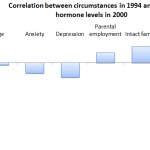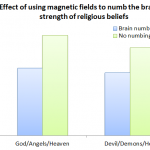
The ancient Greek philosopher Xenophanes once scathingly pointed out that people imagine god to be pretty much like themselves:
But mortals suppose that gods are born,
wear their own clothes and have a voice and body.Ethiopians say that their gods are snub-nosed and black;
Thracians that theirs are are blue-eyed and red-haired.
Christian tend to depict their god as a bearded white guy in the sky, and Jesus as a blonde Caucasian. And yet the ‘theologically correct’ Christian god is a disembodied force with few human characteristics.
How people think about their god is actually of intense interest to psychologists. In particular, the human tendency to think about gods in anthropomorphic terms (think of all those pictures of God as a bearded white guy in the sky), in contrast with the ‘theologically correct’ Christian view of god as a disembodied force with few human characteristics.
For example, perhaps people think about god as being a kind of disembodied human mind. Or perhaps they find that difficult. Perhaps if put under time pressure they instinctively think of god as being more like a regular person. Or maybe they think of god as being something like a superhero – a regular person but with a few extraordinary powers (this is the idea that memorable supernatural beings are ‘minimally counter-intuitive).
There’s some evidence for all three of these different ideas. So Andrew Shtulman (Occidental College, Los Angeles) and Marjaana Lindeman (University of Helsinki) set out to test which was correct.
They ran three studies with a similar set-up. Basically, they asked a bunch of people whether god has a variety of attributes – things like whether god can know things, make plans, be happy, or see things – as well as body-related things like breathe, exert force, has a brain etc.
What they found was that people tended to attribute psychological properties to god over physical properties. If you come from a Christian background, you might find that unsurprising.
What was surprising, however, is that they conducted one of the studies with Hindus in India. Hinduism embraces anthropomorphism much more than the Judaeo-Christian religions, but they found that Hindus were only slightly more likely to attribute physical properties to god – and, like the Finns and American in their study, they were much more likely to give their god psychological properties.
Strangely enough, they found that religious people were more likely than the non-religious to attribute both physical and psychological properties to god. It seems that being religious is not a guarantee of being more theologically correct!
They found similar results after putting people under time pressure (asking their subjects to give an answer as quickly as possible). The results clearly showed that people in both the USA and India find it easier to attribute psychological properties to god than physical ones. They quickly rejected most physical properties and, on the occasions when they accepted them, it took longer to make that decision.
Put together, these results show that people don’t tend think of gods in a ‘minimally counter-intuitive’ way. That’s interesting because it’s been shown that children do think about gods in this way. It seems to be something we are educated out of as we grow up.
But the results also show that people don’t have different instinctive and deliberative views of god. It’s not that they instinctively think in anthropomorphic terms, only to reject is on sober reflection.
And that’s odd, because people definitely do think about gods in anthropomorphic ways that are fundamentally incompatible with theologically correct ideas. For example, people frequently talk about god as if they have limited knowledge, or can’t be everywhere at once.
Shtulmanand and Lindeman explain it like this:
The logical inconsistency between (a) claiming that God is omniscient and (b) imposing limitations on God’s knowledge in a story-recall task may not be obvious to most people even at an explicit level. Barrett and Keil assumed that people could only make such a mistake if they held representationally distinct God concepts activated in cognitively distinct tasks, but out data suggest that many people are psychologically content to attribute logically incompatible properties.
In other words, the answer to the mystery of why people tend to think about god in ways that are incompatible with their own beliefs might simply be that they don’t realise that what they’re saying doesn’t make sense!
![]()
Shtulman, A., & Lindeman, M. (2015). Attributes of God: Conceptual Foundations of a Foundational Belief Cognitive Science DOI: 10.1111/cogs.12253













